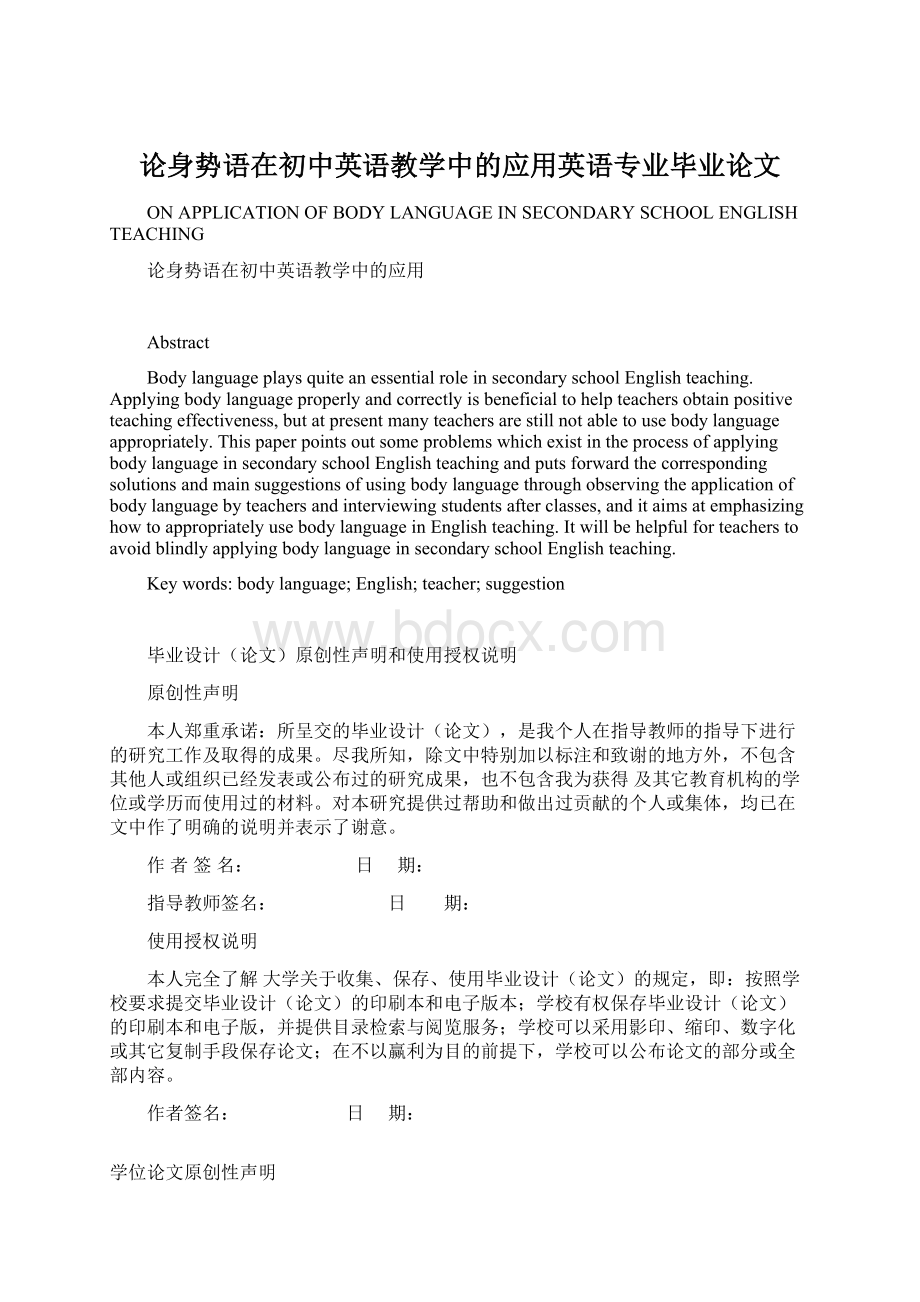论身势语在初中英语教学中的应用英语专业毕业论文.docx
《论身势语在初中英语教学中的应用英语专业毕业论文.docx》由会员分享,可在线阅读,更多相关《论身势语在初中英语教学中的应用英语专业毕业论文.docx(19页珍藏版)》请在冰豆网上搜索。

论身势语在初中英语教学中的应用英语专业毕业论文
ONAPPLICATIONOFBODYLANGUAGEINSECONDARYSCHOOLENGLISHTEACHING
论身势语在初中英语教学中的应用
Abstract
BodylanguageplaysquiteanessentialroleinsecondaryschoolEnglishteaching.Applyingbodylanguageproperlyandcorrectlyisbeneficialtohelpteachersobtainpositiveteachingeffectiveness,butatpresentmanyteachersarestillnotabletousebodylanguageappropriately.ThispaperpointsoutsomeproblemswhichexistintheprocessofapplyingbodylanguageinsecondaryschoolEnglishteachingandputsforwardthecorrespondingsolutionsandmainsuggestionsofusingbodylanguagethroughobservingtheapplicationofbodylanguagebyteachersandinterviewingstudentsafterclasses,anditaimsatemphasizinghowtoappropriatelyusebodylanguageinEnglishteaching.ItwillbehelpfulforteacherstoavoidblindlyapplyingbodylanguageinsecondaryschoolEnglishteaching.
Keywords:
bodylanguage;English;teacher;suggestion
毕业设计(论文)原创性声明和使用授权说明
原创性声明
本人郑重承诺:
所呈交的毕业设计(论文),是我个人在指导教师的指导下进行的研究工作及取得的成果。
尽我所知,除文中特别加以标注和致谢的地方外,不包含其他人或组织已经发表或公布过的研究成果,也不包含我为获得及其它教育机构的学位或学历而使用过的材料。
对本研究提供过帮助和做出过贡献的个人或集体,均已在文中作了明确的说明并表示了谢意。
作者签名:
日 期:
指导教师签名:
日 期:
使用授权说明
本人完全了解大学关于收集、保存、使用毕业设计(论文)的规定,即:
按照学校要求提交毕业设计(论文)的印刷本和电子版本;学校有权保存毕业设计(论文)的印刷本和电子版,并提供目录检索与阅览服务;学校可以采用影印、缩印、数字化或其它复制手段保存论文;在不以赢利为目的前提下,学校可以公布论文的部分或全部内容。
作者签名:
日 期:
学位论文原创性声明
本人郑重声明:
所呈交的论文是本人在导师的指导下独立进行研究所取得的研究成果。
除了文中特别加以标注引用的内容外,本论文不包含任何其他个人或集体已经发表或撰写的成果作品。
对本文的研究做出重要贡献的个人和集体,均已在文中以明确方式标明。
本人完全意识到本声明的法律后果由本人承担。
作者签名:
日期:
年月日
学位论文版权使用授权书
本学位论文作者完全了解学校有关保留、使用学位论文的规定,同意学校保留并向国家有关部门或机构送交论文的复印件和电子版,允许论文被查阅和借阅。
本人授权 大学可以将本学位论文的全部或部分内容编入有关数据库进行检索,可以采用影印、缩印或扫描等复制手段保存和汇编本学位论文。
涉密论文按学校规定处理。
作者签名:
日期:
年月日
导师签名:
日期:
年月日
摘要
身势语在初中英语教学中扮演着十分重要的角色。
正确合理地运用身势语有利于帮助教师达到积极的教学效果。
但目前仍有很多教师不能恰当合理地运用身势语。
本文通过对教师课堂运用身势语的观察以及课后与学生们的访谈,指出了教师在初中英语教学过程中应用身势语的方面所存在的问题,给出了对应的解决对策并提出了使用建议,目的在于强调如何正确应用身势语。
这将有助于教师在初中英语教学中避免盲目地使用身势语。
关键词:
身势语;英语;教师;建议
Introduction
Inthe21stcentury,economicglobalizationhasagreatinfluenceonthewaysofpeople’slivingandsurviving,andthecompetitionofthecomprehensivenationalstrengthismoreandmorefierce,whilebehindthecompetition,itisthecompetitionofthequalityofeducation,thedevelopmentoftechnologyandeliteofgenius.However,foreignlanguageteachingmakesaspecialcontributiontoit,yetitstillneedspromotinganditsteachingmethodshavemanyproblems.SodoessecondaryschoolEnglishteaching.
Bodylanguage,akindofnonverbalcommunicationthatconveysemotionsandexchangesinformationthroughbodymovements,suchaseyecontacts,facialexpression,gesturesandpostureandsoon,isanindispensablewayinteachingEnglishefficiently.Appropriatelyapplyingbodylanguagecanimproveteachingqualityandefficiencyandmaketheclassfullofvividnessandinteresting.Therearemanyevidencescanprovebodylanguageisimportantnomatterinstudyorcommunication.AfamousanthropologistE·T·Hallpointedout:
“silentlanguageexpressesmoreinformationthanverballanguagebecauseitcontainsmuchinformation”(Hall,1959:
32).AndanAmericanscholarJuliusFastseemstosupportthisview,inthebookTheSilentLanguage,hestatesspeechissilverandsilenceisgolden(Fast,1970,citedinDeng,2009).Besides,ShenMinxian,thewriterofTheUseoftheBodyLanguageinElementarySchool,mentionstheartistryofbodylanguage,includingeyecontacts,facialexpressions,gestures,andposture.Healsoarguesthebodylanguagehasafunctionofattractingstudents’attentionandcomplementingspokenlanguageinclassteaching(citedinShen,1999:
126).Moreover,thebookACaurseinEnglishLanguageTeachingemphasizestheimportanceofusingbodylanguageforteacherstakingactivitiesintheclassroominordertocreateahappy,warmingandcomfortablelearningatmosphereforinteractingbetweenteachersandstudents(citedinWang,2006:
159).Nevertheless,someteacherscouldnotappropriatelyusebodylanguageintheirteachingclass.It’sworthfindingoutusingproblemsandcorrectingthemintimeinordertohelpteachersgainteachinggoalseasily.
ThisstudyfocusesonpointingoutproblemsofapplyingbodylanguageinsecondaryschoolEnglishteachingandputtingforwardthecorrespondingsolutionsthroughobservingtheprocessofteachers’teachingandinterviewingstudentssothathelpteachersavoidimproperlyusingbodylanguage.Thispaperdividedintothreeparts.Thefirstpartisthegeneralintroductionofbodylanguage,includingthedefinition,featuresandclassificationofbodylanguage;thesecondpartprovidestheapplicationofbodylanguageinsecondaryschoolEnglishteachingindetailswhichcontainsproblemsandsolutionsofapplyingbodylanguage;andthelastpartexploresmainsuggestionsofapplyingbodylanguageinsecondaryschoolEnglishteaching.
1Generalintroductionofbodylanguage
Bodylanguageisonekindofthenonverbalcommunicationwhichplaysanessentialroleinpeople’dailycommunicatinglifeanditisnecessarytointroducetopeopleinordertosmoothlycommunicatewithoutmisunderstanding.
1.1Thedefinitionofbodylanguage
Manydefinitionsofbodylanguagehavebeenformulatedbyvariousformsasthefollowingdemonstrated:
TheOxfordEnglishDictionary(revisedin2005)definitionis:
“Bodylanguage,noun,theconsciousandunconsciousmovementsandposturesbywhichattitudesandfeelingsarecommunicated.Forexample,hisintentwasclearlyexpressedinhisbodylanguage”(Jiang,etal.,citedin,Zhuang,2009).
OxfordAdvancedLearner’sEnglish-ChineseDictionary(thesixthedition)providesadifferentdefinition:
“bodylanguage,noun,andtheprocessofcommunicatingwhatyouarefeelingorthinkingbythewayyouplaceandmoveyourbodyratherthanbywords”(Lu,2004:
175).
Inconclusion,bodylanguageistheconsciousandunconscioustransmissionandinterpretationoffeelings,attitudesandmoodsthroughaseriesofphysicalmovementandsurroundingsandrelationshiptoothers.
1.2Featuresofbodylanguage
First,thesamebodylanguagewithdifferentmeanings.Forexample,“stampone’sfootinChinameansangry,regretorfrustrated,butinEnglishcountriesitmeansimpatient”(Deng&Liu,1989:
149).
Second,differentbodylanguageiswithsimilarconception.Therearetwodifferentbodylanguagestoexpress“Iamfull”.Chinesepeoplealwaystouchorpadtheirstomachgentlybutpeopleinwesterncountriesusuallyputahandintheirthroatwhichmeanstheyarefull.
Third,bodylanguageinonecultureiswithoutequivalent.Somebodylanguageonlyexistsinoneculture.Forexample,chewingone’sfingernailsemotionallyindicatesstress,worryanddoesnotknowwhattodo.
1.3Classificationsofbodylanguage
Intheinterculturalcommunication,themostcommonwaytoclassifythebodylanguageisbythemovementofhumanbody.Samovarusedtheterm“bodybehavior”,andclassifieditintoappearance,bodymovement,facialexpression,eyemanagement,touching,sub-language,olfacticbehavior,andsoon.“Brosnahanuses“gestures”torefertotouching,space,appearanceposture,bodybehavior,armmovement,legmovement,handmovement,headmovement,facialexpression,eyemanagement,noisyandsilentdecorations,theenvironment,andsoon”(Hu,1995,citedinWang,2011:
465).Fromallthesewaysofclassification,peoplecanknowbodylanguagemainlyincludesthemovementofeverypartofaman’sbody,notjustlimitstothebodymovement.Thispaperwillintroducetheeyelanguage,facialexpression,gestureandpostureindetails.
2TheapplicationofbodylanguageinsecondaryschoolEnglishteaching
Withthediversityofthemethodsofteaching,bodylanguagehasbeenusedinEnglishteaching,especiallyinprimaryschoolEnglishteachingandsecondaryschoolEnglishteaching.Therefore,theauthorwillgivesomeinformationaboutapplyingbodylanguageindetailswithsomeexamplesbyobservingotherteachersbodylanguageinEnglishteachingandinterviewingstudentsabouttheirviewsofusingbodylanguageinteachingclass.
2.1ThecurrentsituationofsecondaryschoolEnglishteaching
Tobeginwith,accordingtothequestionnaire,therearesomestatisticsaboutthesatisfactiontowardlearningfromstudents.Incities,72%pupilsfeelhappyorveryhappyaboutgoingtoschool,whilethereareonly27%secondaryschoolstudentswhoareinGradeThreethinkthatitishappytogotoschool;incountries,justonly32%studentsacknowledgethatitishappytogotoschool(Yin&Chen,2004:
36).Thecausesaremany-sided,butthemainfactorisofteachers’inhospitalityandviolenceandstrict,andsometeachershaveaterribleimpressiononstudents,whichmakesstudentsfeelthat“theheartsoftheirteachersarefullofice!
”
Atpresent,secondaryschoolEnglishteachingfacestwoimportantproblems:
thelevelofEnglishteachingislowbehindhandandthemethodsofEnglishteachingaresimpleandout,whichleadtocomingoutmanydeaf-Englishanddummy-Englishlearners,andevensomestudentsquittheirEnglishstudybecauseoflackingofbasicEnglishknowledgeandnointerestinlearningEnglish.ItcouldnotbedeniedthatsomeoldEnglishteacherstreatthemassuperiorteacherandtheythinktheirexperienceismoreauthoritativethanothers,sotheyjustteachinanusualwayonlyforseekinghighmarksinsteadofignoringthedemandoftheirstudents;andsometeachersjustonlyforfinishingtheirtasktoteach,theydon’tcareaboutwhattheirstudentsreallyneedandhavelearned.Onlyasmallpartofteacherscandowellinbothteachingknowledgeandarousingstudents’interest.Therefore,thepressingtaskistofindouttheseteachingproblemsindeals